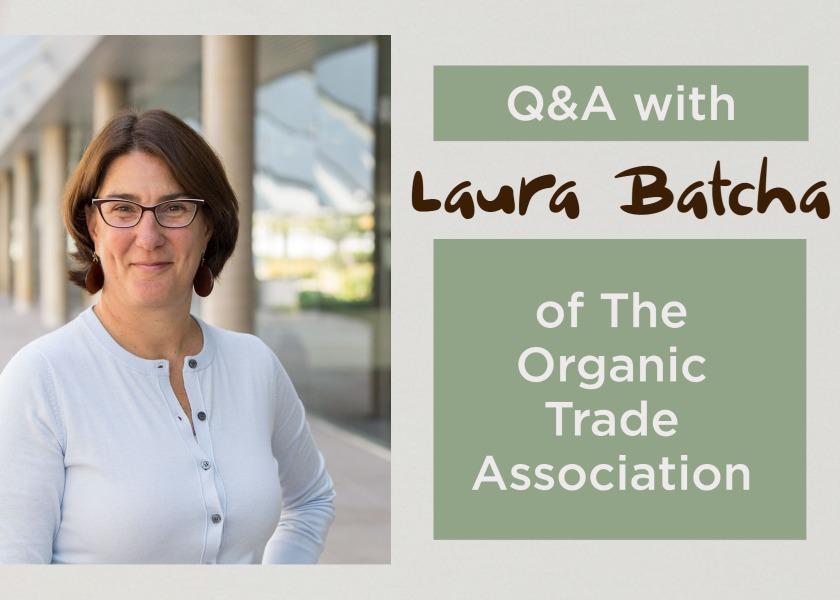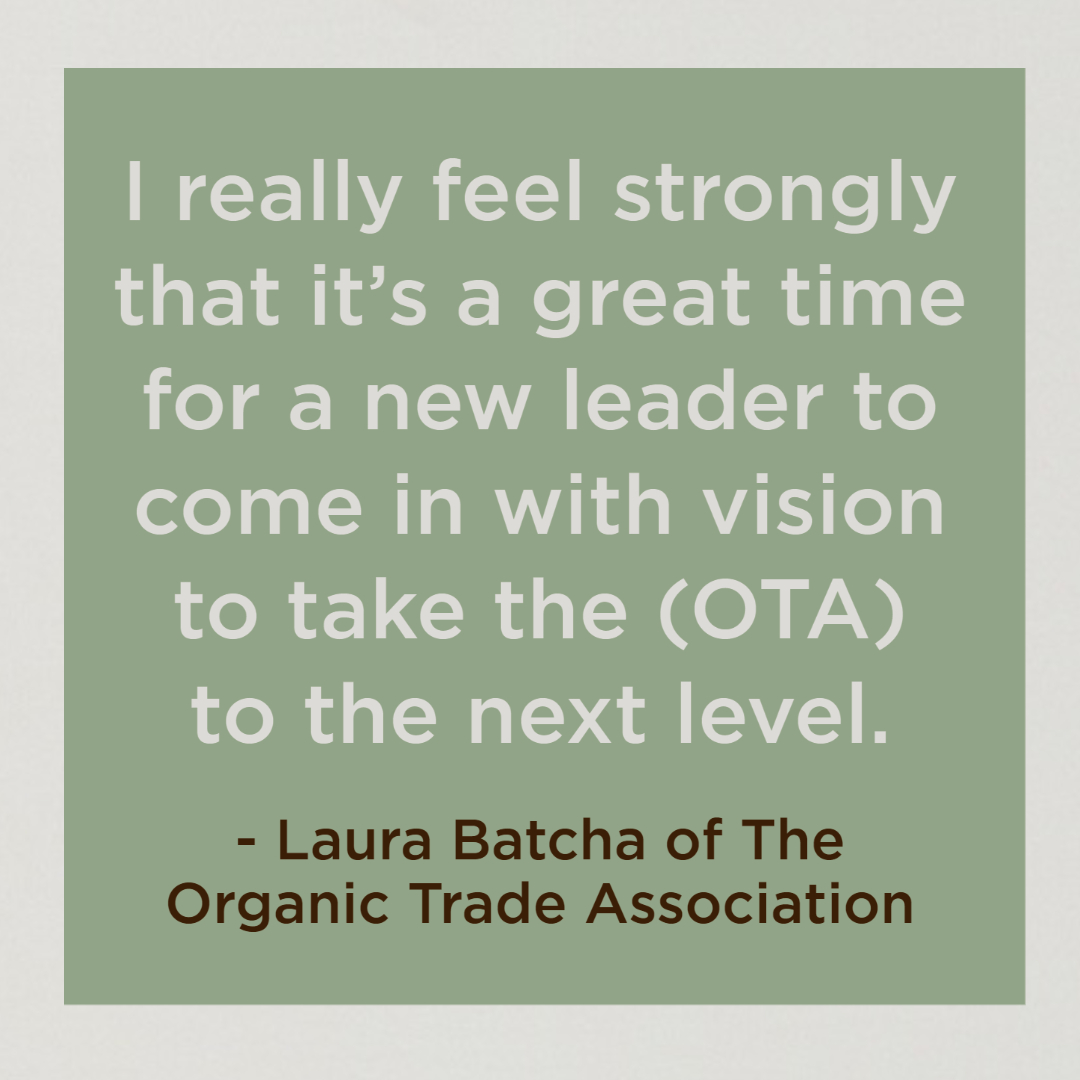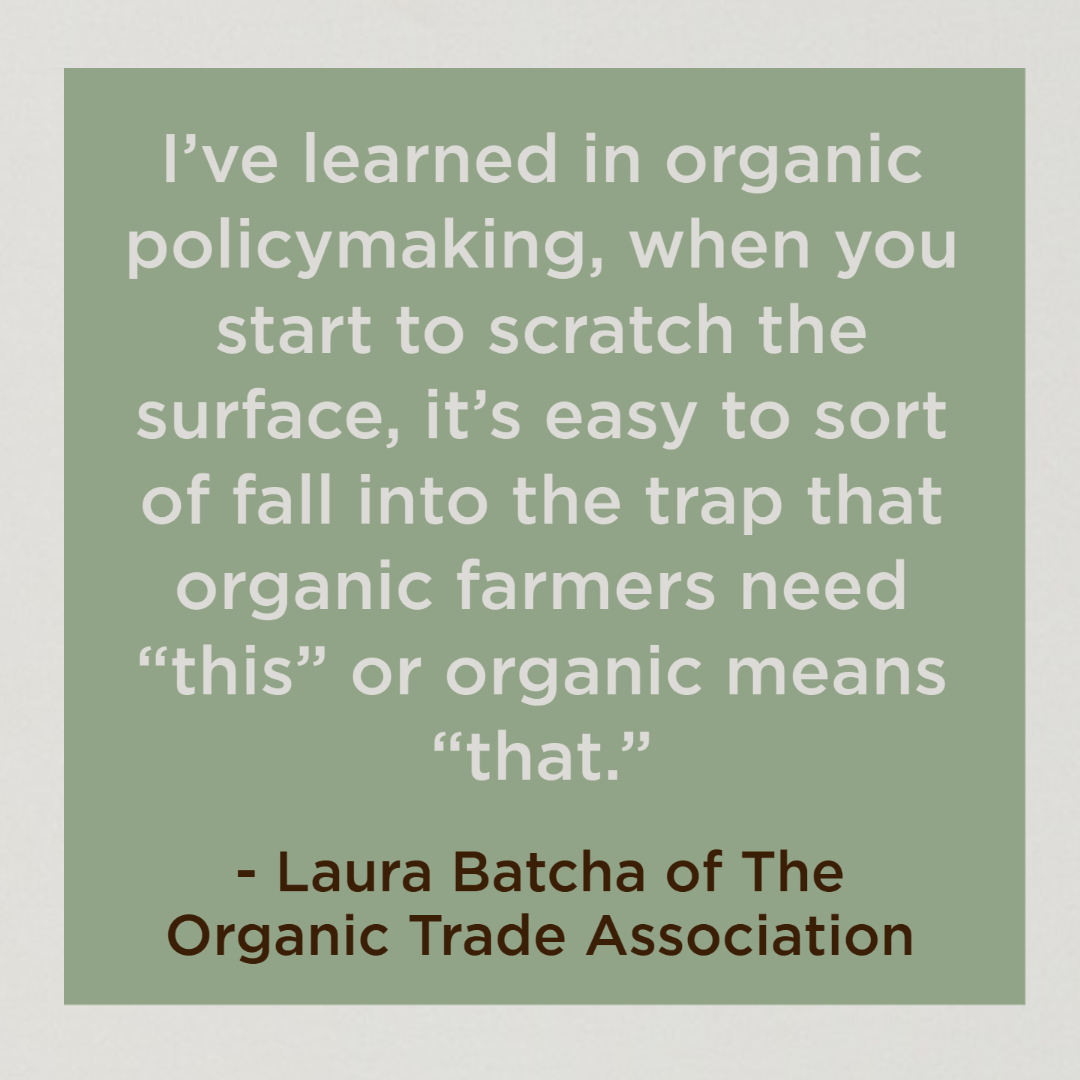Q and A with Laura Batcha of The Organic Trade Association

Batcha talked with The Packer’s Tom Karst on Oct. 20 about that decision, some of the accomplishments of the organic industry since she came to the OTA in 2008, and what may be next.
Q: You have had some big news this week. You are going to be leaving the group next spring, correct?
A: It is nice to speak with you, Tom. The planned departure date is spring 2022. And I’ve been working with our board of directors of the trade association for a few months now behind the scenes, getting set up for an orderly succession. We’re live with the search. The first thing I’ll say is, all you interested, passionate organic advocates, take a look at (the position) on Kornferry.com. We want to see a lot of good talent come through the recruitment process.
Q: The organic industry continues to grow, and your organization also has grown. As you thought about leaving the group, that must have been a tough decision. What were you thinking about as you considered your next step?
 A: Thirteen years is a good amount of time within an organization. For me, personally, I really thrive on new things, and growing and learning. I think, like a lot of people coming through COVID, it’s a good time (for me) to think about what’s next, the next trajectory.
A: Thirteen years is a good amount of time within an organization. For me, personally, I really thrive on new things, and growing and learning. I think, like a lot of people coming through COVID, it’s a good time (for me) to think about what’s next, the next trajectory.
That was my own internal process. But as far as the organization goes, I really feel strongly that it’s a great time for a new leader to come in with vision to take the (OTA) to the next level.
I’m really proud of what I’ve accomplished with the team at OTA over more than a dozen years. We’ve come so far in our own work, but I also know that a fresh perspective really can stimulate creativity and position the organization for what’s next.
OTA looks nothing like it did when I joined almost 13 years ago. I really trust that somebody smart and talented, with a little bit of guts and some vision, will take OTA to a level that we can’t even really imagine now over the course of the next decade. I really like to think that it’s a good time for change. I think sometimes changing leadership can bring that energy and stimulate what’s next.
Q: We were talking about how the organization has changed since you got there. The farm bills are part of that equation. The OTA has been able to increase the visibility of organics and the funding for organic projects and priorities. What are some of the accomplishments that you look back on?
A: I think for the organization, when I look back to almost 13 years ago, we did not have a permanent presence in Washington, D.C., as an organization. I came to the OTA midstream in the 2008 farm bill work. I think that was a watershed farm bill for organic across the board, not due to my effort at OTA — I really jumped in midstream on that — but there was a real step change in the structure of the provisions that support organic in the 2008 farm bill. Then we’ve been able to build on that system.
Back in 2008, the National Organic Program probably had six staff people. We didn’t have a presence in Washington. We were faxing membership renewals out to our members, and it was really much harder in those days to organize members to get them engaged, because we were so reliant on physical presence and physical meetings to do things. I look at where we are now, and at any given time, we have literally hundreds and hundreds of members volunteering hours in committees on important work that they self-select. We’ve developed a nimble way where members don’t have to commit to serving on standing committees the way you might in some traditional trade associations. We really deconstructed all of that. And our process is much more nimble; people hop in on the very specific things they want (to do), and when the work’s done, and it comes to a close, and the capacity is available to move on to another pressing issue, it really it helps us cover so much (more ground).
We’ve achieved things at the public policy level, but what we’ve achieved organizationally, in terms of facilitating members doing the work that’s important to them, it has been really, really important.
We’ve come a long way in Washington on some of our initiatives that are supported through public policy and the farm bill.
We’ve also achieved some things that folks in Washington didn’t think we could achieve. The referendum on the organic checkoff initiative that we embarked on (was one).
(Editor’s note: The proposed checkoff for organic was sidelined by the Trump administration).
Regardless of where the checkoff initiative ultimately ended up, it was a big eye-opener for us about how to be effective, and how to look to the future. And I think those lessons are some of the things I’m most proud of because we rely on those learnings today.
We have a new (organic-related) bill that we introduced with members of Congress in spring of 2021, with good bipartisan support.
And it is the same kind of profile of members that are the early adopters of the work that we’re doing. We like things to be bipartisan, and we really lean on the newer generation of congresspersons to help advance the issues related to organic.
Q: You did so much work with the checkoff program. And then, of course, the follow-up to that with the voluntary promotion efforts. Do you think that that checkoff concept can be revived? Do you hope for that in the future?
A: I think that that will be up for the next leader of the association to assess that. The only thing I would say is, if not that, (then) something else. I think you have to strive to try things and risk not ultimately being successful because it stimulates conversation and sometimes things like that work, and they can be a huge game-changer. And sometimes they don’t, and you learn along the way. But I think the only thing I would say is I would encourage whoever comes after me to take on something big and try.
Q: As you as you think about the role of OTA in the industry, do you feel your organization has helped unify the organic growers and suppliers out there in important ways? How has your group helped the organic industry in terms of bringing it together and moving it forward?
A: The work we do at the Organic Trade Association is so much more complicated than a single commodity focus for agriculture, because not only is it every crop type, it’s also every point in the supply chain. So, we’re complex in both of those dimensions. So,

trying to work to hold all that together in a way that creates values for the members is an important piece of the work that we do across the value chain.
It is about understanding the interdependency and providing opportunities for people to learn from each other and try to find win-win ways to solve problems as it relates to organic. And I think the same is true across crop types, but the thing that I’ve learned in organic policymaking, when you start to scratch the surface, it’s easy to sort of fall into the trap that organic farmers need “this” or organic means “that.”
The minute you go down that road, whatever it is you’re either talking about or striving for, it is going to be inadequate; that is the thing that I really learned.
There’s so much difference in the regions and the commodity types and the crop types in terms of what the needs are.
We’re working right now with USDA — they’re considering major investments spearheaded by Secretary Vilsack for $200 million just for transitioning to organic, which is great in and of itself. But we’ve been working with (USDA) to help them get their heads around that it cannot be as “one size fits all.” And farmers across the country are going to react very differently to that proposition, depending on where they’re sitting in the country, in the supply chain, what types of crops they’re producing; you’ll never be able to get a public policy (issue) that goes across the board.
Everybody being at the table at the (OTA) is beneficial because it reinforces the diversity and the complexity. It is not one size fits all. But beyond that, I think what we can provide is a space that reminds everybody that they have some similar stakes in the marketplace, around the brand and what the brand needs. And we’ve worked through a lot related to integrity and enforcement in the last number of years; we have tested some work around promotion and education, through the checkoff idea.
I think the next wave of that is going to be about a common effort on relevance in the marketplace, as interest expands in climate, smart agriculture, regenerative agriculture, sustainability issues, redefining what sustainable footprints in agriculture mean. The industry is going to have a lot of work to do to come together, commonly to decide how to stay relevant, because it won’t work if soybean (growers) try to carve their own path to relevance within organic space, and apples, another path, and leafy greens, another one, and dairy, another sense of what it means to be relevant. The Organic Trade Association is really the only place where you could do that work from the common perspective of brand.
Q: If you think about what advice you would give an incoming person, what are one or two issues that you will talk about with them?
A: One thing I would say is just recognizing the diversity within organic. People are not always going to agree, and that’s OK. And that doesn’t necessarily have to be ultimately solved for; you have to be respectful in the space and learn and evolve.
But I think to over-emphasize the idea that people are not supposed to have a range of opinions is probably not a good use of the amount of energy that it takes to do the job and move forward.
I think that we have an opportunity in the next three years and the Biden-Harris administration to advance some public policies that will be very supportive of organic. And I would encourage the whole industry and whoever comes after me to do their best to seize that moment, and backtrack from where you want to be three years from now and really stay focused on that. Be looking at the next farm bill as a way to institutionalize the gains that can be made in this administration.
In the last administration — not to be political about it, because we did well with organic in prior Republican administrations — but the Trump administration was tough on organics at USDA.
It left the industry vulnerable. And so there needs to be learning about that, to really make sure that that the industry can survive that again, the next time. What are the guardrails that can be put in place that won’t allow a large walking back of what’s been accomplished?

There is an opportunity to do a lot in the next three years. And I think the climate conversation and the sustainability conversation, organic has to get out of its own box and engage those conversations and be open and creative about that as well. So, I think the next phase of leadership within organic is to embrace being relevant in those spaces.
Q: And as we close up here, I know you talked about how bringing someone in might be good for the organization. How about you? Have you figured that out yet, what you’re going to be doing next?
A: It’s a work in progress, Tom. So, I haven’t completely worked it out. I’ve been in organic my entire professional life — so, in one form or another before I came to OTA, not in the public policy space, but in farming and in the organic and natural products industry. I suspect I will always have some foot in the door. But I’m looking at transitioning to professional life focused on the law and legal work. I’d like to spend more of my time, honestly, on tangible personal work rather than the conceptual big battles. So, I think I’ll still probably take on some of those battles within organic, but I’ll try to be focused on balancing with other work and stay a little bit closer to home.







